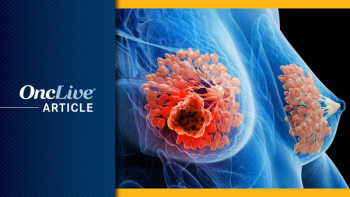
Widespread Mutation Testing for NSCLC
Transcript:
Geoffrey R. Oxnard, MD: One thing I struggle with in my newly diagnosed patients is, do I send a focus set of tests to perhaps more quickly get a few results back, like EGFR, ALK, or ROS? Or, do I send a broad panel that gives me the EGFR sequence plus a range of other, rarer variants? Our current practice at the Dana-Farber Cancer Institute is somewhere in the middle. We send a quick ALK and ROS immunohistochemistry test. Those IHC tests are pretty well done by our pathologists at least, to find ALK and ROS cases. And then, for sequencing, we do a broad panel that gives us EGFR, KRAS, BRAF, MET, and HER2 rearrangements, and a range of tumor suppressors and other rare variants. What that gives us is—with about the same amount of time, about the same amount of specimen, and about the same cost—a huge range of variants instead of just a focal variant. And with the newer variants coming along and the greater range of targeted therapies, we increasingly feel that panel-based testing is a way to create the most treatment options for our patients.
Sandip Patel, MD: Currently, larger panels—which I define as either a clinical whole exome or even 300 or 400 gene panels—are often used for patients with refractory solid tumors or lung cancer in which we’re looking for a driver mutation, so oftentimes in a never-smoker who has had sequencing done. I actually just had a patient today who had standard-of-care testing done with smaller PCR-based panels— EGFR, ALK, and ROS1—and those were negative. And, upon testing with a broader 400-gene panel, a driver mutation was detected. Typically, in the right clinical context, a broader panel is favored. Tissue-based approaches can often have 300-, 400-gene panel tests or even clinical exome now, which allows us to survey the entirety of the cancer genome. And liquid biopsy approaches, such as cell-free DNA, now let us query almost 75 genes. I think between the tumor-based methods, which test more genes, and liquid biopsy-based methods, both would help us in patients who have difficult-to-access tumors because of where their cancer is located, or for patients who develop resistance to targeted therapy. I think liquid biopsies are particularly important in that setting.
One of the ways we utilize whole exome sequencing in an academic medical center is actually for cell therapy-based approaches. If we’re trying to determine which specific T-cell population to amplify for what we call TIL therapy or tumor infiltrating lymphocyte therapy, we need both the exome to look at all the mutations that the cancer has, as well as to find the patient’s HLA type so that we can engineer a specific cellular product for that specific patient. So, I think beyond that unique clinical context, or for a patient who’s a never-smoker and has non—small cell lung cancer for which even a 400-gene panel did not detect a driver mutation, these are 2 scenarios in which we may consider a whole exome-based sequencing strategy that typically is done in academic medical centers and likely not currently of immediate use in a community setting. However, the 300- or 400-gene tumor–based NGS panels, in particular, are likely to be beneficial even in the community setting. And the liquid biopsy approaches, for which we have 60- to 70-plus gene panels, may be of utility in the community setting as well as in the academic setting.
Geoffrey R. Oxnard, MD: NCCN guidelines now suggest panel testing as the most thorough way of getting genomic testing for lung cancer, in order to create the greatest number of options for our patients. It’s the most complete approach to create targeted therapy options and improve treatment outcomes. And so, if there are NGS [next-generation sequencing] panels available for you and if you can get them reimbursed, we often can, if you have enough tissue for it, reach for an NGS test as an alternative to a standard EGFR test on its own.
Transcript Edited for Clarity






































